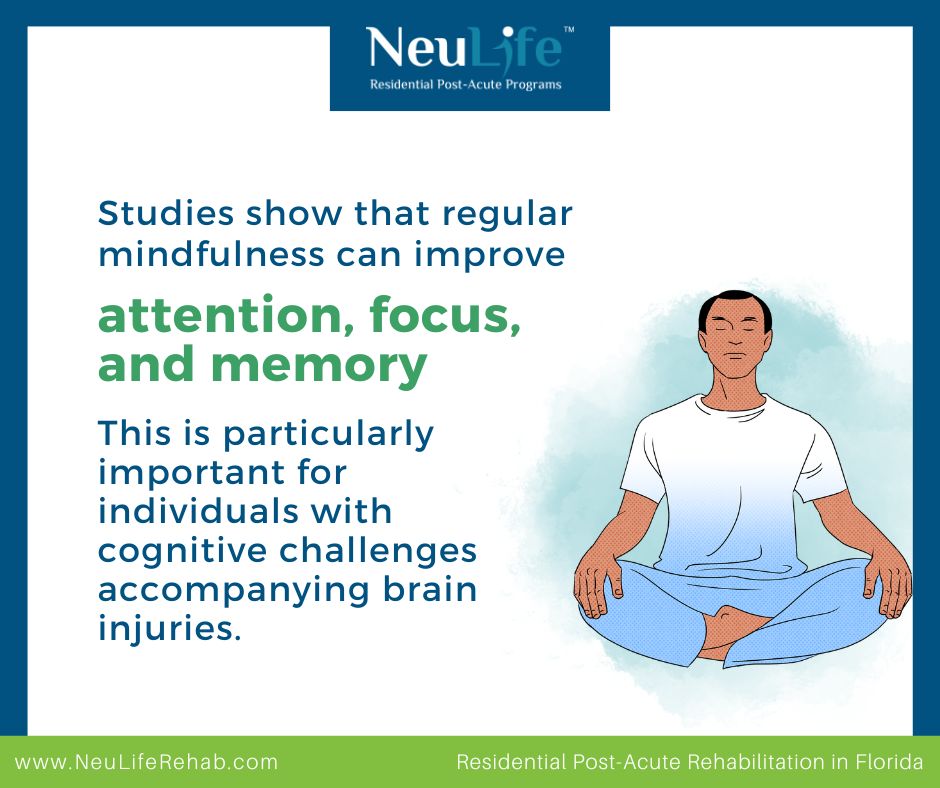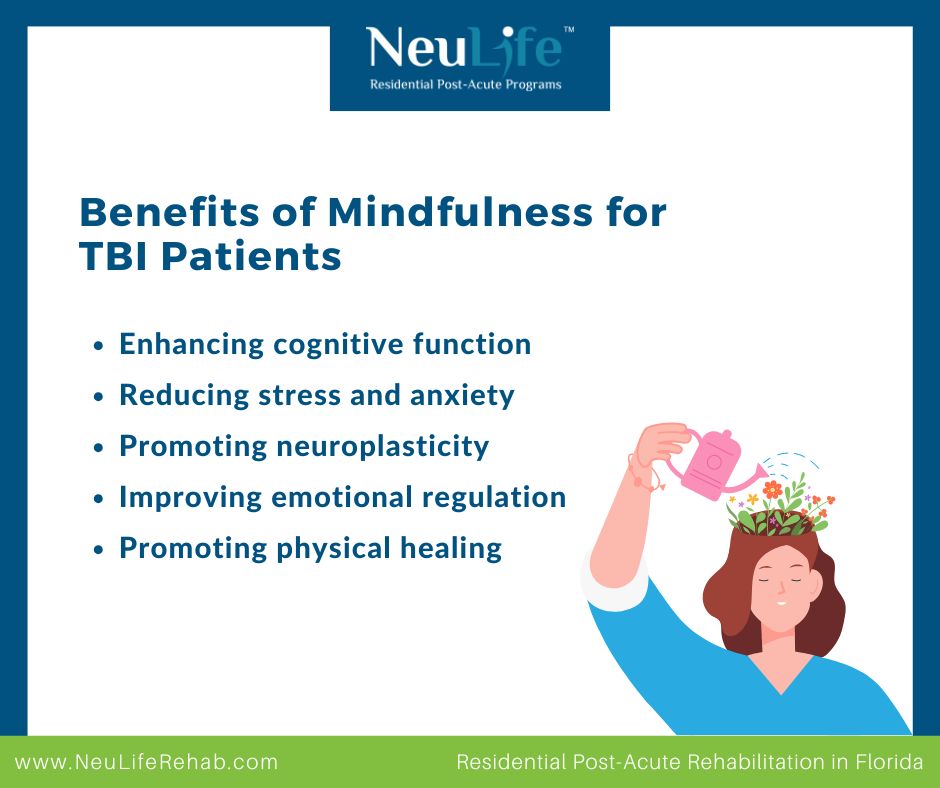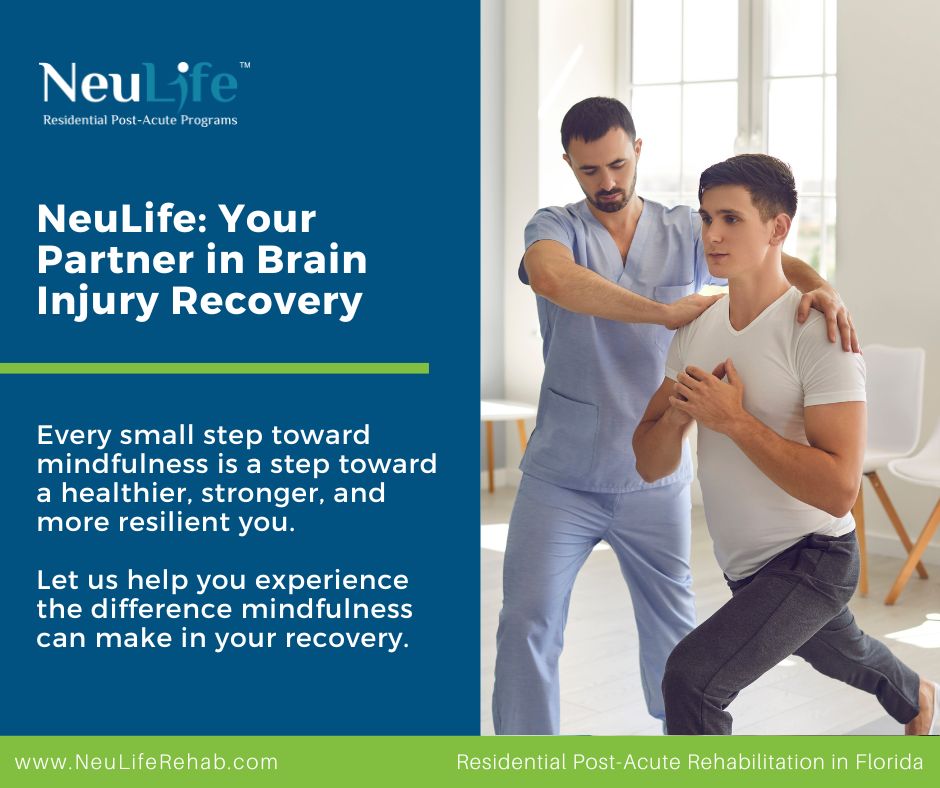Recovering from a brain injury can be a challenging and transformative journey. It involves managing physical and cognitive changes while adapting to new daily routines. But amid this demanding process, there is a powerful tool that can aid recovery: mindfulness.

Mindfulness is the practice of being fully present in the moment, and it can help patients navigate the emotional, mental, and physical changes that come with brain injuries.
By incorporating mindfulness into recovery routines, individuals can improve their focus, reduce stress, and support their brain's natural healing processes.
Mindfulness is a practice that involves paying attention to the present moment without judgment. It's about being fully aware of your thoughts, feelings, and sensations without getting caught up in them. Essentially, it's a way to train your mind to focus on the here and now.
Mindfulness works by redirecting your attention away from ruminating thoughts or worries and toward the present moment. This can be done through various techniques, such as:
Developing a greater awareness of your thoughts, feelings, and sensations can help you manage the challenges associated with brain injury. Here's how mindfulness can benefit your recovery:
Mindfulness meditation has been shown to support cognitive function, which is crucial after a brain injury. Studies have found that regular mindfulness can improve attention, focus, and memory. This is particularly important for individuals with cognitive challenges accompanying brain injuries.
When practicing mindfulness, the brain's prefrontal cortex—the area responsible for decision-making and concentration—is activated, which can strengthen these cognitive abilities over time. This helps individuals focus on tasks, make decisions with greater clarity, and retain new information during their recovery.
After a brain injury, many people experience heightened anxiety due to uncertainties about their recovery, changes in their abilities, or fear of future injuries.
Mindfulness helps by training the brain to focus on the present moment, reducing the mental habit of ruminating on worries. As a result, stress hormones such as cortisol are lowered, creating a more relaxed state of mind.
Neuroplasticity is the brain’s ability to reorganize itself by forming new neural connections. This ability is essential during recovery after a brain injury, as the brain attempts to adapt and compensate for any damage.

Mindfulness practices have been shown to encourage neuroplasticity by fostering the growth of new neural pathways. When individuals engage in regular mindfulness meditation, they stimulate areas of the brain related to focus, self-regulation, and emotional control.
Brain injuries often lead to difficulty regulating emotions, resulting in sudden mood swings or intense emotional responses.
Mindfulness teaches individuals to observe their emotions without being overwhelmed by them. This practice strengthens the brain's ability to process emotions in a balanced way.
Mindfulness can also support physical healing after brain injury. Studies have shown that mindfulness practices can reduce pain, improve sleep, and boost the immune system.
You can create an optimal environment for your body to heal and recover by cultivating a sense of calm and relaxation.
Various mindfulness techniques can be adapted to suit your individual needs and preferences. Here are some popular practices to consider:
A simple yet effective way to begin mindfulness meditation is through mindful breathing. Here’s how you or your loved one can practice this:
Start with just five minutes a day, gradually increasing the duration as you become more comfortable. This practice helps center the mind and can be incredibly calming when anxiety or frustration arises during recovery.
Body scan meditation is an excellent way to reconnect with your body and bring awareness to any tension or discomfort.
This practice helps improve bodily awareness and can provide a sense of relaxation. Thus making it a valuable tool for individuals experiencing physical discomfort after a brain injury.
Guided meditation apps can be a great starting point for those new to mindfulness. Apps like Headspace, Calm, and Insight Timer offer structured meditation sessions tailored for beginners and specific needs, such as stress relief and sleep improvement.
Incorporating gentle, mindful movement into your routine can particularly benefit individuals recovering from a brain injury.
Practices like yoga or tai chi focus on slow, deliberate movements and emphasize breathing and body awareness. These activities not only help improve balance and coordination but also provide a way to release tension and build strength.
Even if physical limitations exist, modified versions of these practices can be tailored to suit individual needs.
Starting a new practice can be overwhelming, especially when recovering from a brain injury. That’s why it's important to set realistic goals and celebrate small milestones.
Begin with a few minutes of meditation each day and gradually increase the duration as it becomes more comfortable. Remember, consistency is more important than perfection.
On days when it feels challenging to focus, simply sitting quietly and paying attention to your breathing for a few moments can make a difference.
NeuLife Rehabilitation is dedicated to providing top-notch therapy services for individuals recovering from traumatic brain injury (TBI). Besides physical and cognitive therapy, we also believe in the power of mindfulness to enhance brain injury recovery.

Our therapists at our neuro rehabilitation center incorporate mindfulness techniques into their treatment plans. This helps you manage stress, improve cognitive function, and regulate emotions.
If you or someone you know has experienced a brain injury, don't hesitate to reach out to one of the best TBI rehabilitation centers.
Contact NeuLife today to learn more about our post acute rehabilitation.
The material contained on this site is for informational purposes only and DOES NOT CONSTITUTE THE PROVIDING OF MEDICAL ADVICE, and is not intended to be a substitute for independent professional medical judgment, advice, diagnosis, or treatment. Always seek the advice of your physician or other qualified healthcare providers with any questions or concerns you may have regarding your health.

We know that choosing the next step in your recovery from a catastrophic illness or injury is complex. Together, we can help you take the next step.
Contact us with any questions today.